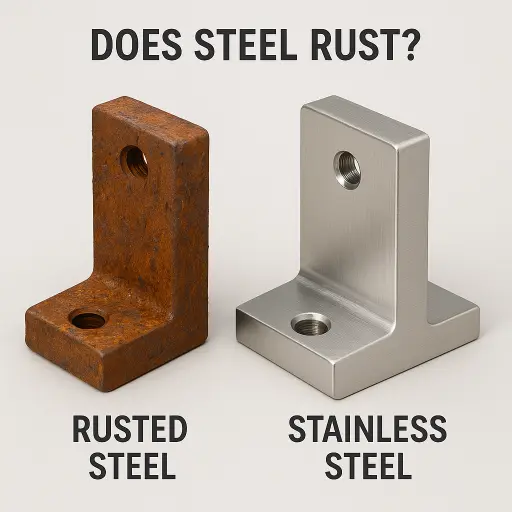Does Steel Rust? | Understanding Corrosion Resistance for Metal Components
When selecting materials for mechanical components, the question “Does Steel Rust?” is a common concern for engineers, buyers, business owners, and product managers. In this Corrosion Resistance Guide for Metal Components, we’ll offer clear answers on the causes, mechanisms, and effective solutions for rust and corrosion issues.
What Is Rust and Why Does Steel Rust?
Short Answer:
Yes, steel does rust.
Steel is primarily made of iron (Fe). In the presence of moisture and oxygen, iron undergoes an oxidation reaction that forms iron oxide—commonly known as rust.
Basic Rust Reaction:
Fe + O₂ + H₂O → Fe₂O₃·xH₂O (Rust)
Even corrosion-resistant steel types can rust under extreme conditions, but the speed and severity depend heavily on environmental exposure.
Will Steel Rust Outdoors?
Short Answer:
Yes, steel will rust outside, especially in humid, coastal, or polluted industrial environments.
Steel Corrosion Rates by Environment
| Environment Type | Corrosion Rate (μm/year) |
|---|---|
| Indoor Dry Environment | 1–3 |
| Urban Industrial Area | 20–50 |
| Coastal Salty Atmosphere | 50–100 |
Corrosion-Resistant Steel: What Are Your Options?
Choosing corrosion-resistant steel significantly improves the lifespan of components exposed to corrosive environments.
Common Corrosion-Resistant Steels
- Stainless Steel (e.g., 304, 316 Grades)
High chromium content (>10.5%) forms a passive chromium oxide layer that prevents rust. - Weathering Steel (e.g., Corten Steel)
Forms a stable rust-like appearance after exposure, which protects deeper layers. - Galvanized Steel
Coated with a layer of zinc to serve as a sacrificial anode.
Case Study:
A coastal city installed public guardrails made from 304 stainless steel. After 10 years in a high-salt environment, the guardrails remained bright and corrosion-free, while nearby carbon steel structures showed extensive rust within 2–3 years.
Can Alloy Steel Rust?
Does alloy steel rust? Will alloy steel rust?
The answer: It depends.
- High-alloy steels (e.g., stainless steels with >12% chromium) are highly corrosion-resistant.
- Low-alloy steels (<5% alloying elements) are still susceptible to rust in harsh conditions.
Summary:
Not all alloy steels are corrosion-proof. Choosing the correct grade based on environmental exposure is crucial.
Does Brass Rust?
Another frequent question: “Does brass rust?” or “Do brass rust?”
Short Answer:
Brass does not rust.
Brass is an alloy of copper and zinc, containing no iron. Rust formation (iron oxide) is a phenomenon exclusive to iron-containing metals.
However, brass can corrode, developing a protective green patina (copper carbonate) under moist or salty conditions.
Table: Comparison of Brass and Steel Corrosion
| Property | Brass | Steel |
|---|---|---|
| Main Composition | Copper + Zinc | Iron + Carbon |
| Rust Formation | No (but can tarnish) | Yes |
| Patina Formation | Greenish layer | Red-brown iron oxide |
| Outdoor Longevity | Excellent | Requires protection |
Case Study:
Historic brass door handles in coastal churches remain structurally sound after centuries, despite surface green patinas, whereas exposed iron elements have heavily rusted and degraded.
What Metals Do Not Rust?
Looking for what metal will not rust? Here’s a quick list of metals that don’t rust or are considered non-rusting metals:
| Metal | Corrosion Behavior |
|---|---|
| Stainless Steel | Forms a protective chromium oxide layer |
| Aluminum | Forms a natural aluminum oxide barrier |
| Copper | Develops stable protective patina |
| Nickel | High corrosion resistance in acids |
| Titanium | Extremely corrosion-resistant |
Internal Link Suggestion: Read more about Aluminum Corrosion Protection and why does aluminum alloy rust.
Rust-Resistant vs Corrosion-Proof Metals
Rust-resistant metal specifically refers to the ability to resist iron oxide formation, while corrosion-proof metals resist a broader range of chemical attacks including acids, bases, salts, and moisture.
- Rust Resistant Metal Examples: Stainless Steel, Galvanized Steel
- Corrosion Proof Metal Examples: Titanium, Nickel Alloys
Important Note:
No metal is 100% “corrosion-proof,” but some offer extremely high resistance, making them ideal for critical applications.
How to Protect Steel From Rust?
here are proven methods to prevent it:
Common Rust Prevention Methods
- Use corrosion-resistant steels like stainless or weathering steel.
- Galvanization: Applying a protective zinc layer.
- Protective Coatings: Paints, epoxies, or powder coatings.
- Structural Design: Avoid water-trapping areas.
- Regular Maintenance: Clean and inspect regularly.
Best Practice for Critical Parts
In extremely aggressive environments (marine, chemical plants), consider non-corrosive metals like titanium or specialized stainless steels.
Related Reading: Does Aluminum Alloy Rust? | Is Aluminum Rust Proof?
Conclusion
Whether you’re asking “Will Steel Rust?” or “Can Brass Rust?”, understanding each material’s properties and its protective strategies is crucial for ensuring product durability and reliability. This Corrosion Resistance Guide for Metal Components will help you choose the right rust-proof metal or corrosion-resistant steel, paired with proper design and maintenance, to keep your mechanical components performing well over time.
If you need help selecting the right materials or setting up an anti-corrosion strategy, feel free to contact us — we’re here to help you build stronger, longer-lasting products!

